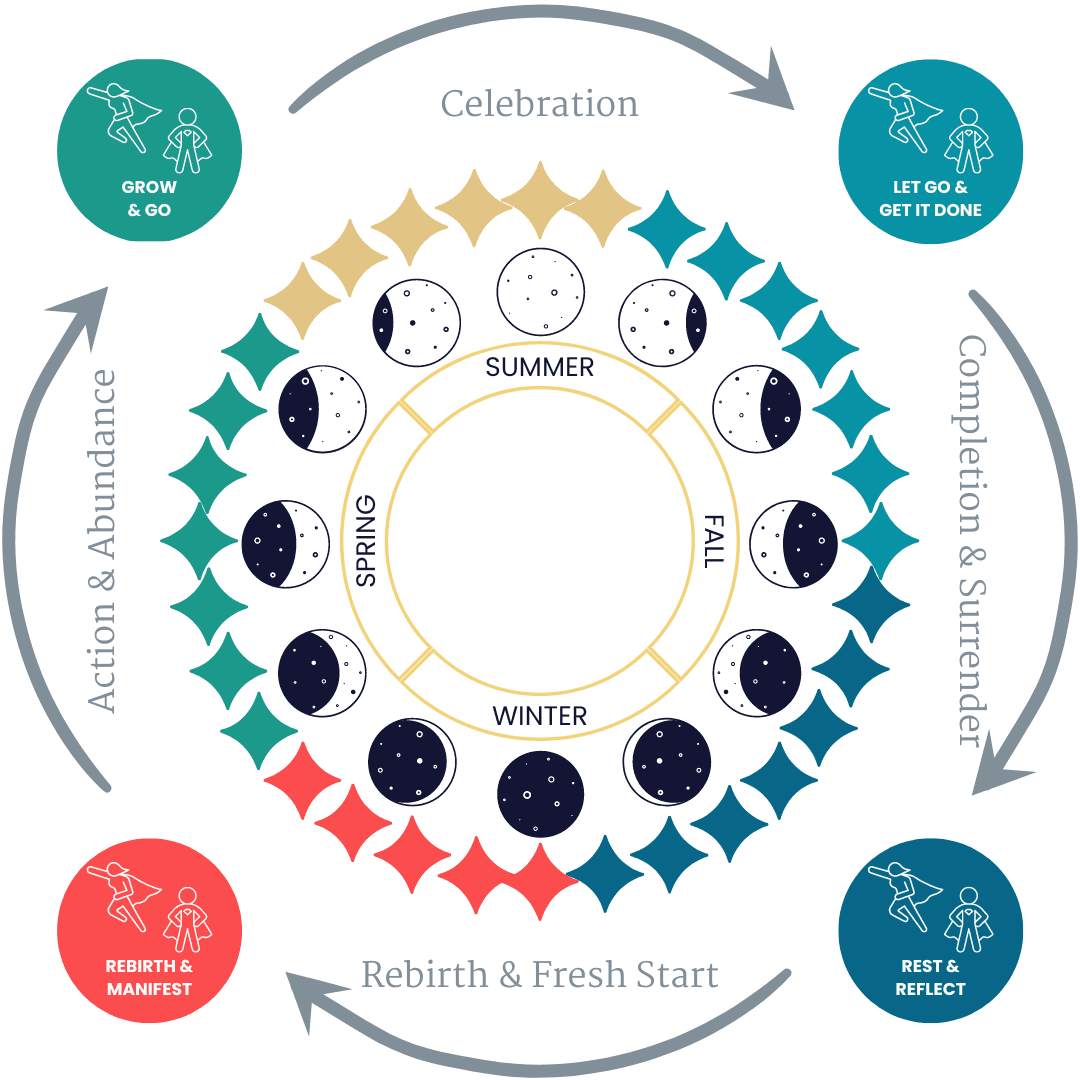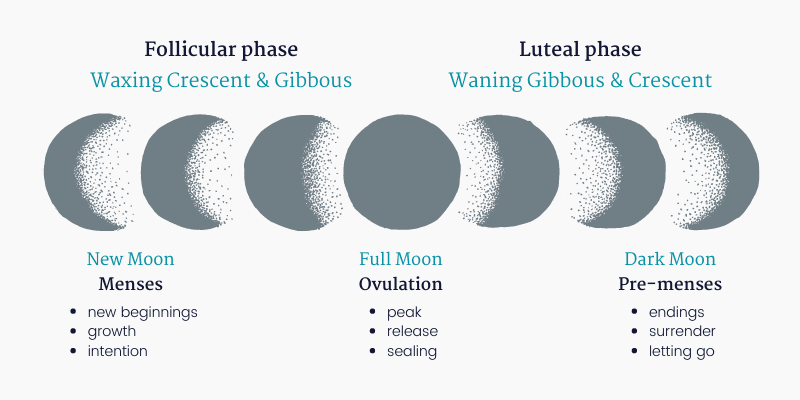
The Baba Yaga Cycle Circle is where science meets spirituality. We do not believe in an either, or
mentality, but rather hold the both, and
belief. Wherever we can, we will cite scientific sources, and where it’s not possible (either because there aren’t any or because the available studies seem badly-designed or less-than-trustworthy), we will note this. We hope you use the information gathered here and inside the app with discernment and find out what’s true for you.
For a long time now - especially since modern feminism and the current awakening of spirituality - people claim that, originally, we were all synced up with the moon. Can’t be a coincidence, right? After all, we are supposed to have a 28-day long cycle and the moon cycles every ~28 days. Well, the scientific community is not convinced.
The thing is: while it’s not the 28-day cycles but rather the 29.5-day cycles that seemingly match so nicely, research has never been able to confirm this hypothesis. However, there are some studies that can verify lunar cycle effects on sleep quality, which differ between whether or not your mentruation starts with the new moon or the full moon.
Important to note is that the causalities are so complicated when it comes to your hormones, that there simply is no one “normal” out there. Know yourself. Track your cycle. Track it in relation to the moon cycle to find your unique patterns. Track your mental and physical wellbeing to better understand your own causalities - or at least your correlations.
Once we move past rigid prejudice and open ourselves up to alternative concepts of simplifying these lunar and/or menstrual phases, we can take some pointers from wiccan moon practices which describe which energies are prevelant during certain moon phases. And in a way, this is an easy enough simplification to start with. It is crucial to observe your own cycle patterns and to find out whether you feel similar effects and then to adjust.

1
Onset of menses = inner new moon
→ rebirth out of death, new beginnings
2
Follicular phase = inner waxing moon
→ growth, intention, decision making, refinement
3
Ovulation = inner full moon
→ peak, release, sealing of intention
4
Luteal phase = inner waning moon
→ letting go, gratitude, forgiveness, surrender
5
Pre-menstrual phase = inner dark moon
→ death, endings
It is important to emphasize the inner
here. These moon phase correspondences are not meant to dictate a synchronization with the moon, but rather a way of looking at your own inner world in terms of the moon.
Observe your cycle to learn more about whether these patterns are true for you or what your own patterns look like.
Practical tip:
On each of your cycle days, track your moods, behaviors, feelings, and health. This could be a simple mindfulness practice at the end of the day, but make sure to record it somehow. Write it down or audio record it for yourself. After a few cycles, you should already be able to see your patterns.
If you feel called to, sign up here as beta tester and help us co-create an amazing app that’ll do the heavy analyzing for you!
Become a beta testerHave you heard of practices such as cyclical nutrition and sports training planning, yoni steaming, or feeding your bleed?
Conventional medicine and science are limited when it comes to the female physiology. Most applications in modern-day life are based on scientific studies done predominantly on men. This means, that a large part of fitness and diet suggestions, for example, are not actually studied on female physiologies (or hardly). Not to mention the distinct bias against woman in pain and injury detection, relief, and prevention. If you’ve ever bent over from period cramps for several days at a time and you’ve gotten the tip to simply take pain killers every time this happens, you’ll likely have already started looking for alternative approaches to pain relief, yourself.
While the scientific community is slowly but surely trying to fill this research deficit, it is still quite hard to find significant correlations and causalities. A major added difficulty here is the volatility of our hormonal cycle; our cycle is subject to constant change and all kinds of external and internal influences.
Here are just a few:
Your cycle gradually gets shorter over the course of your life:
your periods gradually get shorter
your ovulation can gradually move up in time
your luteal phase can vary greatly and eventually even decrease in length
Your cycle is influenced by internal factors, such as
your quality of sleep
your BMI
your stress levels
your daily activity rate
your overall mental & psychological health
Your cycle is also influenced by external factors, e.g.:
the environment you live in
the kind of food you nourish your body with
the medication you’re taking
any drugs you might be taking
how much alcohol you drink
the people you live with
likely the moon
Observe your cycle to learn more about whether these patterns are true for you or what your own patterns look like.
Practical tip:
On each of your cycle days, track your moods, behaviors, feelings, and health. This could be a simple mindfulness practice at the end of the day, but make sure to record it somehow. Write it down or audio record it for yourself. After a few cycles, you should already be able to see your patterns.
If you feel called to, sign up here as beta tester and help us co-create an amazing app that’ll surprise you with insights and tips from both, the latest scientific and alternative wisdom available!
Become a beta testerSources & Credits
Bull, J.R., Rowland, S.P., Scherwitzl, E.B. et al. Real-world menstrual cycle characteristics of more than 600,000 menstrual cycles. npj Digit. Med. 2, 83 (2019). https://doi.org/10.1038/s41746-019-0152-7
Komada, Y., Sato, M., Ikeda, Y., Kami, A., Masuda, C., & Shibata, S. (2021). The Relationship between the Lunar Phase, Menstrual Cycle Onset and Subjective Sleep Quality among Women of Reproductive Age. International journal of environmental research and public health, 18(6), 3245. https://doi.org/10.3390/ijerph18063245
Disclaimer
It is extremely important to note that we are fully aware of the - still - gross lack of accurate & well-designed meta-analyses to make any kind of generalizable conclusions or statements about all cycles, all periods, and all menstruators. However, we aim to A, bring awareness to the personal importance of cycle tracking and B, point out that poor study design and this wide-spread unwillingness to even tackle this topic are not an acceptable status quo.